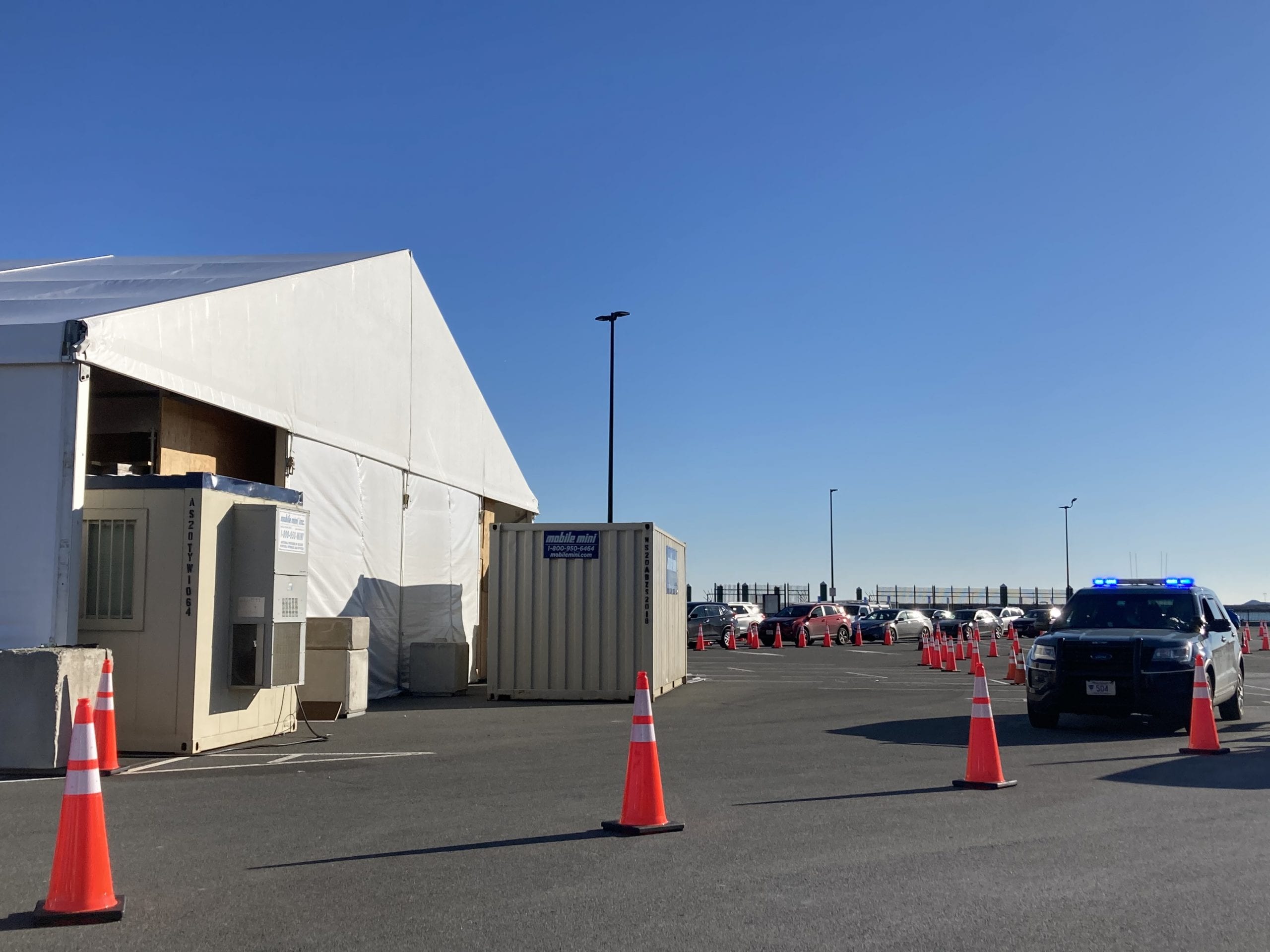Lynn’s largest COVID-19 testing site was shut down on Friday in the midst of the post-holiday surge that has led to skyrocketing case numbers locally and statewide.
The Blossom Street Extension regional testing site was closed for the day while a diesel fuel leak from a generator was cleaned up, a Lynn Fire Department spokesman said.
Eight local North Shore communities are in the red this week, the state’s designation for municipalities with the highest risk of coronavirus spread.
Consistently low- to moderate-risk Nahant joins Lynn, Lynnfield, Peabody, Revere, Salem, Saugus, and Swampscott as high-risk communities this week.
The local hot spots are led by Lynn, which remains in the top 10, in terms of communities with the highest positive test rate in the state.
Fire Capt. Joseph Zukas said testing at the Lynn site was initially able to continue while firefighters spread SpeedyDry, an oil absorbent, on the spill and set up portable dikes to contain it, but operations at the site were later halted for the rest of the day.
“Basically, it was a fuel leak. It was a minimal leak,” Zukas said.
Zukas said two of the four testing bays were shut down while the cleanup continued and Lynn Water & Sewer Commission was contacted and responded to the leak.
In a statement, Mayor Thomas M. McGee said the Lynn Fire Department, Massachusetts Department of Environmental Protection, and Clean Harbors had contained the leak and were working to clean the site with the hope that testing would be able to resume Saturday.
“Thank you for your patience during this unanticipated situation,” McGee said.
The free regional express testing center was opened last month by the state and equipped to perform up to 2,000 COVID-19 tests per day. The site is operated by Project Beacon and will remain open through at least March 31. It is located in the parking lot off the Lynnway once used for the former Lynn-Boston ferry.
By mid-afternoon Friday, McGee said Project Beacon was working to reschedule all missed appointments, including rebooking appointments at the company’s other regional testing sites in Framingham and Revere.
Anyone who had an appointment should check the Project Beacon website: app.beacontesting.com.
In Lynn, 169 new cases and an additional death were reported on Friday to bring the city’s caseload to 12,397 and its death toll to 166. A total of 1,926 cases are active and 10,305 people have recovered, according to city data.
The city’s positive test rate, which is seventh highest in the state, increased from 13.92 percent to 14.63 percent this week. But the daily incidence rate in Lynn decreased from 101.7 to 99.6 new cases per 100,000 residents per day over last week, according to the state Department of Public Health (DPH).
Revere, another COVID hot spot, also reported a large spike in cases on Friday. With 139 new cases reported, the city now has 7,540 cases and 127 people have died, according to the city website.
Revere saw a slight uptick in its positive test rate this week, which increased from 12.29 percent to 12.75 percent. But its daily incidence rate dropped slightly, from 110.9 to 109.4 new cases per 100,000 residents over the past 14 days, according to the DPH.
Nahant Town Administrator Antonio Barletta and the town’s Board of Health are urging residents to remain vigilant as rising case numbers have elevated the community to a high-risk designation this week.
With two new cases reported on Friday, Nahant now has 158 cases and six deaths. The town’s daily incidence rate is 68.5 new cases per 100,000 residents — up from 46.4 last week — and its positive test rate is 4.73 percent over the past 14 days, according to town and DPH data.
“Now that the holiday season has passed, the state is continuing to see a significant rise in COVID-19 cases due to community members traveling and attending holiday gatherings,” said Barletta. “Unfortunately, our community is not immune to this significant increase in positive cases. We would like to continue to stress the importance of all of our community members to follow public health guidance.”
Peabody (4,676 cases, 240 deaths) has reported 192 new cases and four additional deaths since Wednesday, Lynnfield (739 cases, 20 deaths) reported no change in its numbers on Friday, and numbers were not updated in Saugus or Swampscott.
Peabody’s positive test rate is 9.58 percent and its daily incidence rate is 92.4 new cases per 100,000 residents over the past two weeks, according to the DPH.
Saugus, which has a daily incidence rate of 105.1 new cases per 100,000 residents and a positive test rate of 11.4 percent, has reported 2,577 cases and 51 deaths as of Thursday.
In Swampscott, 682 cases and 13 deaths have been reported as of Thursday. The town has a daily incidence rate of 82.4 new cases per 100,000 residents and a positive test rate of 6.11 percent.
Salem (3,010 cases, 61 deaths) has a positive test rate of 7.17 percent and a daily incidence rate of 69.5 new cases per 100,000 residents this week, according to the DPH.
Moderate-risk, or yellow, Marblehead has reported 54 new cases since Monday to bring the town’s total numbers to 789 cases and 31 deaths, according to town data.

